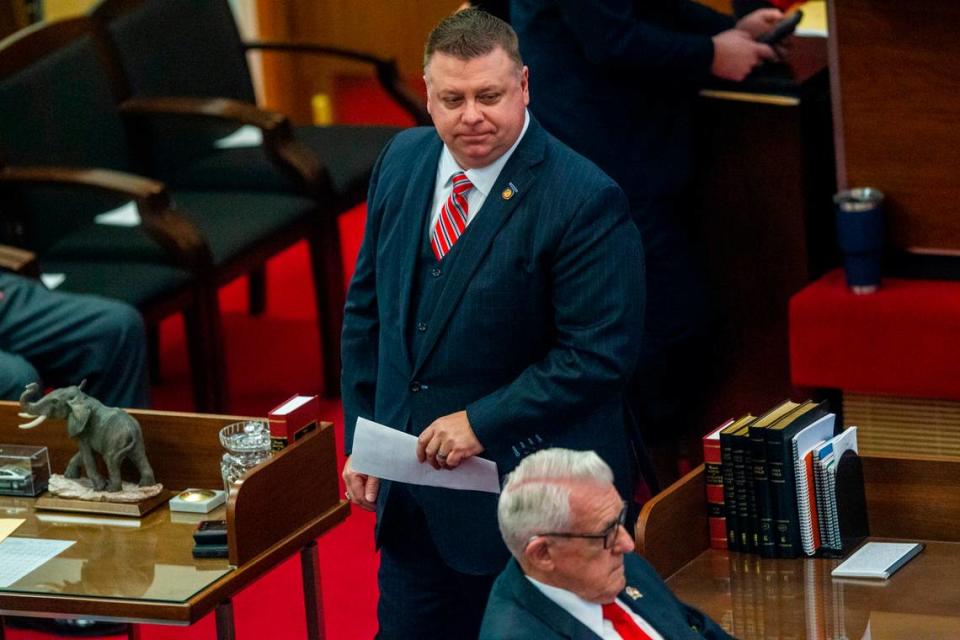NC budget on fast track, including more raises for teachers and state employees
The North Carolina state legislature is on track to give more raises, fund capital projects and possibly offer tax cuts during this year’s session.
One factor that extended the 2021 budget process was months of back-and-forth negotiations between the House and Senate on a total spending amount. That deal has already been reached, House Speaker Tim Moore said Wednesday.
One of the House’s top budget writers, Lincolnton Republican Rep. Jason Saine, told The News & Observer in an interview on Thursday that total spending number is between $29.5 billion and $30 billion. That’s for the year starting in July 2022 and ending in June 2023.
Budget timeline
Moore told reporters when the session started last week that both raises and tax relief were priorities when the General Assembly passes a budget bill this summer. In odd-numbered years, the legislative long session is the time to pass a two-year budget, but the spending plan is often adjusted during an even-numbered year’s short session. Legislative leaders are optimistic that the session could be done by the Fourth of July, and a budget bill sent to Gov. Roy Cooper’s desk even earlier than that.
“This is really what the short session is intended to be — to tweak the budget and go home,” Saine said.

Here’s what budget leaders are considering:
Raises for teachers, state employees and retirees
▪ Raises for state employees and teachers on top of the 2.5% that state employees, and teachers on average, are already getting this coming year. Cooper’s budget proposal calls for additional 2.5% raises for state employees.
“We’re in that ballpark,” Saine said, but that the number is still fluid as talks continue.
He said lawmakers knew coming into the session that state employees’ raises would be “incredibly important” this year, especially for worker retention and because of inflation. “We’re trying to do what we can,” he said.
▪ Cooper also proposed adjusting the salary schedule for teachers so they receive at least a 7.5% increase between this past year and the upcoming fiscal year. Saine said that budget negotiators are considering teacher raises that are front-loaded, meaning higher raises for teachers in their first five years of their career.
▪ Moore said leaders are looking at a cost-of-living adjustment for retired state employees, either through recurring money or a bonus. Saine said the House hopes it can be a recurring raise.
Capital project costs
▪ A new reserve fund for construction and public works projects, known as capital projects, that may cost more than planned because of inflation. The fund would be different from other capital funds or the state’s rainy day fund, and be used for any projects already in the works that may end up costing more than expected.
Saine described it as a “rainy day inflationary fund, but is separate.” It could be as much as $500 million. Budget leaders are also amenable to needs for capital projects on UNC System campuses. Moore also recently told reporters that capital projects would be part of this year’s budget bill.
Tax cuts
▪ Possible further reduction in the personal income tax rate.
Sen. Paul Newton, the Senate Finance chair and the person behind most of the Senate’s tax policy, said they’re still early in discussions on what tax relief will look like.
“If I have my way, there will be tax relief in there,” Newton, a Cabarrus County Republican, told The N&O on Thursday.
“I’m certainly a fan of reducing the personal income tax for North Carolinians. I think when you have excess revenues, that’s the most stimulative thing you can do for the economy, is let people keep their own dollar and spend it wherever they want,” he said.
“I think it’s also best for North Carolina families, especially in a time of high inflation,” said Newton, who is also looking at eliminating more of the franchise tax and increasing the child tax deduction. He said it’s still too early to know if any of that will be in the final version of the budget, however.
Saine said that Republicans are in agreement that reducing the income tax rate is the plan, but it is still to be determined if it is worth trying to accelerate this year, especially after tax cuts in the previous budget. The personal income tax rate was reduced to 4.99% for 2022.
The idea of a tax rebate or refund, which Republicans have proposed in the past, hasn’t gained any ground this time. Leaders are looking toward longer-term tax changes instead of one-time money.
Other possibilities in the budget
▪ Another $100 million for broadband internet expansion.
▪ Demolishing the Bath Building in downtown Raleigh and turning it into green space. That was part of Cooper’s proposal. Saine said it’s “certainly on the table.”
An African American monument on the State Capitol grounds, which is a long-stalled project, hasn’t been discussed yet, Saine said, saying they haven’t gotten to the granular level of budget negotiations yet. He said nobody has been a champion or pushing for it, but no one has opposed it either.
Saine doesn’t see there being a big fight over what ends up being sent to Cooper’s desk. Democrats who were members of the committee that negotiated the budget last year will have some input on the negotiations as they progress over the next few weeks.
“None of us are trying to put something together that gets a veto,” Saine said.
For more North Carolina government and politics news, listen to the Under the Dome politics podcast from The News & Observer and the NC Insider. You can find it at https://campsite.bio/underthedome or wherever you get your podcasts.

 Yahoo Movies
Yahoo Movies 